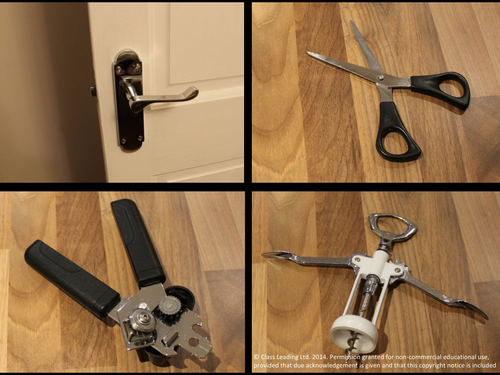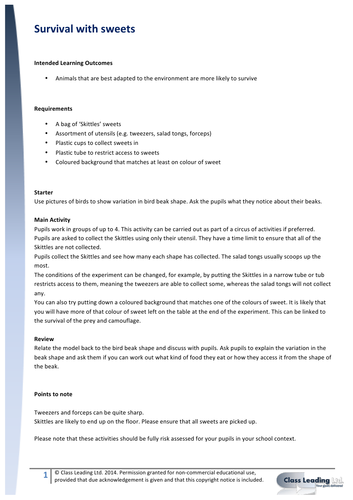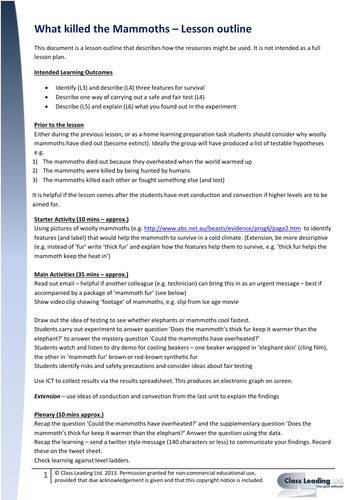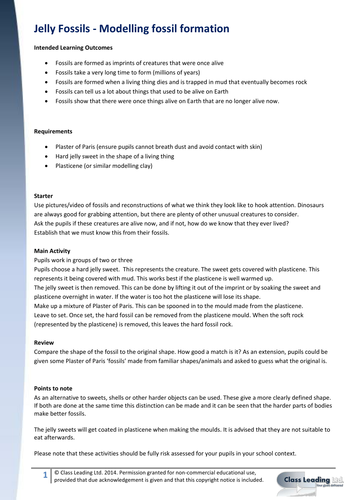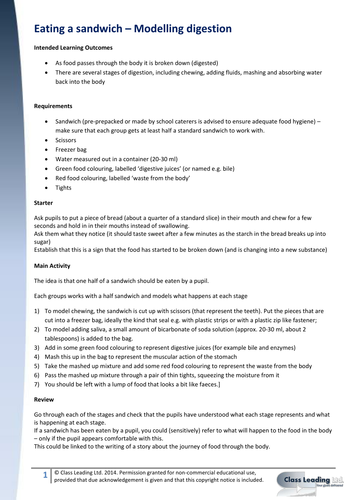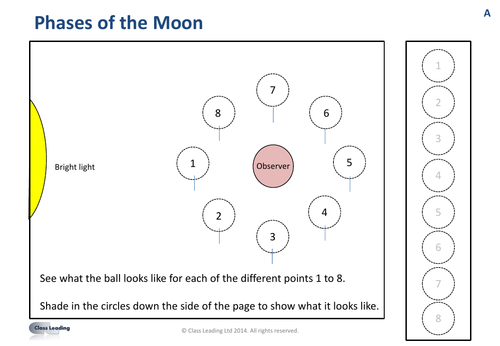314Uploads
262k+Views
194k+Downloads
Primary science

Thinking About - Coke & Mentos
This activity is part of the ‘Thinking About’ Series.
The sequence aims to think through the investigative process using a very engaging activity. It involves learners thinking through the control and measurement of variables.
It can be used to produce and analyse graphs and think through challenging explanations.
There are also some surprising events for further challenge if different soft drinks are used.
In this activity there is a PowerPoint, an activity guide and making and launching guides (which it is recommended that you laminate!)

Everyday levers
In this activity pupils can look at the images of levers and think about where the find them and what they do. Either images or real objects (or a combination) can be used with the two sheets, which are differentiated in terms of the number of expected responses and the questions used. Please note that clock (a 'distance multiplier&') is different to the other levers shown (&';force multipliers') and spotting the odd one out and providing a reason gives an extension for more able pupils. Please ensure that you have carried out a full risk assessment before carrying out any practical activity.

Thinking About Goldilocks and the Three Bears
This activity is a context led approach to look at changes over time, in particular how temperature changes as time goes by.
Children find it much more interesting that watching the change in temperature as water cools.
The activity centres around finding that learners will find surprising helping them make progress as a results. There is an engaging start to the activity through a very familiar story.
Bundle

Thinking About - Primary Investigations
In this bundle, two resource packs are available - Thinking About: Coke & Mentos and Thinking About: Goldilocks & the Three Bears.

Survival with Sweets
This activity is aimed at supporting Primary Science (particularly those in year 6 in the English National Curriculum). The purpose of the activity is to help children understand the idea of ‘survival of the fittest’ using everyday objects that a primary teacher will be able to get hold of, including sweets. This can be played as a game by children or can also be used by a small group to demonstrate to a whole class.

Classification with Hoops
This activity is aimed at supporting primary science (currently year 4 and year 6 in the primary science national curriculum). In this activity, children are encouraged to look at strategies for classification using physical objects that are accessible to most primary science teachers.

What killed the Mammoths (editable)
This is a collection of resources that would work well as a lesson. A lesson outline is provided showing how the resources might be used together. There is an email designed to set the scene and for use as as a ‘hook’. There are also sheets for learners to summarise their learning (tweet).
You may want to supplement the resources with pictures of a woolly mammoth (link only due to copyright restrctions) and video ‘footage’ e.g from Ice Age movie.
This was designed as lesson for a KS3 nurture group although would be suitable for KS2 or other KS3 groups with adaptation.
Please note that this is an editable version. A free, non-editable version is also available.

What killed the Mammoths
This is a collection of resources that would work well as a lesson. A lesson outline is provided showing how the resources might be used together. There is an email designed to set the scene and for use as as a ‘hook’. There are also sheets for learners to summarise their learning (tweet).
You may want to supplement the resources with pictures of a woolly mammoth (link only due to copyright restrctions) and video ‘footage’ e.g from Ice Age movie.
This was designed as lesson for a KS3 nurture group although would be suitable for KS2 or other KS3 groups with adaptation.
Please note that this is a non-editable version. A fully editable premium version is also available.

Jelly fossils - Modelling
In this activity, pupils go through the process of making a fossil of a jelly sweet to show how fossilisation takes place. A description of how to do this is included in the guide. Please ensure that you have carried out a full risk assessment before carrying out any practical activity.

Eating a sandwich - modelling digestion
There are two parts to this activity, one is a practical activity to model the process of digestion. The other is a powerpoint slideshow to show what happens to the food on its journey through the body. If using with KS3 then the learning outcomes on the activity plan could also include breaking up of molecules in digestion. If using with KS2 for the new curriculum, the powerpoint will include some terms/slides that you may wish to miss out, so it has been left in an editable form.
Please ensure that you carry out a risk assessment before carrying out a practical activity.

Phases of the moon
In this activity, pupils are at the centre of model that shows how the Moon orbits the Earth and how this leads to the phases of the moon appearing. A description of how to do this is shown. A worksheet for recording the appearance of the moon model is included, with answers.
There are also links to a NASA video showing the phases of the moon, the first 30 seconds of which could be used to hook learners. A second video showing the experiment is also linked.
Please ensure that you have carried out a full risk assessment before carrying out any practical activity.


